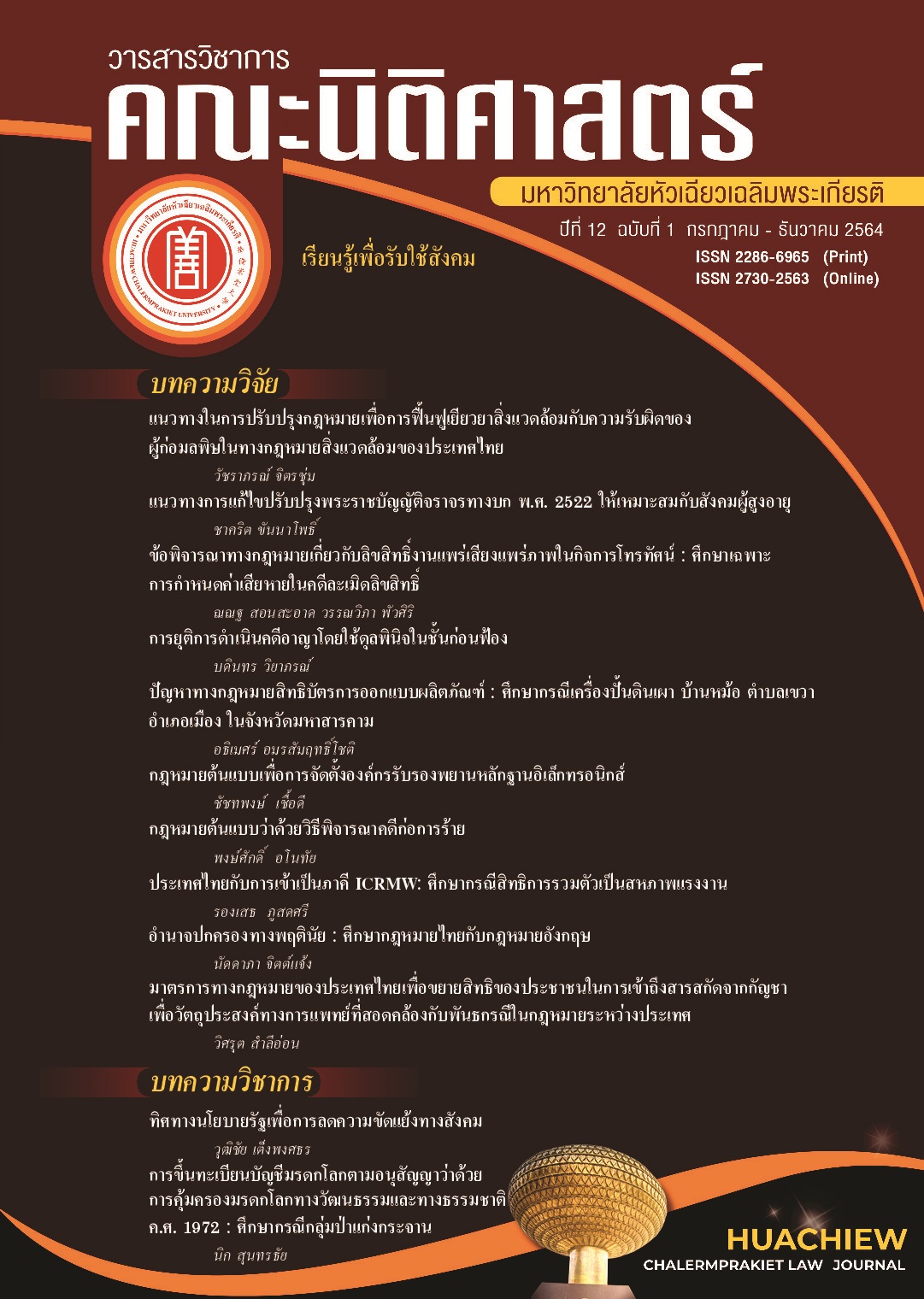The World Heritage List according to The Convention Concerning the Protection of the World Cultural and Natural Heritage 1972 : The Case Study of Kaeng Krachan Forest Complex
Keywords:
World Heritage Convention Natural Heritage Kaeng Krachan Forest ComplexAbstract
Mindful of the importance to safeguard the identity and value of cultural and natural properties so that they can be preserved as heritage for all mankind, Thailand has ratified the 1972 Convention Concerning the Protection of the World Cultural and Natural Heritage in 1987. The Convention has set out the rule and regulation for State Parties to nominate the names and potential sites in their country which can be considered for inscription of the World Heritage List through the system and mechanism prescribed by the Convention. In the past, Thailand had nominated important sites of which five of them were listed as the World Heritage – three as the World Cultural Heritage and two as the World Natural Heritage. Kaeng Krachan Forest Complex was the latest site nominated by Thailand for adding to the World Heritage List. However, the nomination was opposed by the World Heritage Committee due to concerns over the conflict at the Thai-Myanmar border. The conflict was caused by lack of understanding between the state agencies and Karen minority group on the point concerning the latter’s inhabitancy in the heart of Kaeng Krachan Forest Complex. The Karen minority group has originally been living there for a long time. The conflict lasted for over ten years. Eventually, the Kaeng Krachan Forest Complex was successfully added to the World Natural Heritage list at the 44th Ordinary Session of the World Heritage Committee in 2021 based mainly on the forest complex’s outstanding qualification on biodiversity.
But although the listing of Kaeng Krachan Forest Complex had gained success, what the State should be fully aware are the points on respecting the cultural right which is part of human right, community right and ethnic minority group right issues in the context of international and domestic law, as well as on the review of provisions in the Community Forest Act in a bid to support an ideal principle on “People and Forest Living Together” and enhance good relation with original ethnic groups living in the world heritage site reckoning them as part of the World Natural Heritage as well.
References
กรมอุทยานแห่งชาติ สัตว์ป่า และพันธุ์พืช, อุทยานแห่งชาติแก่งกระจาน (10 สิงหาคม 2564) กรมอุทยาน
แห่งชาติ <http://park.dup.go.th/visitor/nationparkshow.php?PTA_CODE=1028>.
ประชาไท, ข่าวเกี่ยวกับชาวกะเหรี่ยงในพื้นที่แก่งกระจาน –ประชาไท (10 สิงหาคม 2564) ประชาไท
<http://prachatai.com/journal/2018/04/76460>.
มติชน, ให้เห็นกับตาและเชื่อมั่น แก่งกระจานสมควรเป็นมรดกโลก? (10 สิงหาคม 2564) มติชน
<https://www.matichon.co.th/news-monitor/news_2431246>.
ศูนย์ข้อมูลมรดกโลก กระทรวงวัฒนธรรม, อนุสัญญามรดกโลก (10 สิงหาคม 2564) กระทรวงวัฒนธรรม
<http://164.115.22.96>con vention>.
สยามสมาคมในพระบรมราชูปถัมภ์, ทนายวัฒนธรรม:ใช้กฎหมายเพื่อคุ้มครองมรดกวัฒนธรรมชุมชน
(กรุงเทพมหานคร: ภาพพิมพ์, 2560).
ส่วนมรดกทางธรรมชาติ กองการต่างประเทศ กรมอุทยานแห่งชาติ สัตว์ป่าและพันธุ์พืช, ส่วนมรดกทาง
ธรรมชาติ (10 สิงหาคม 2564) กองการต่างประเทศ <http://naturalworldheritage.dup.go.th/
news/view?id=2>.
สำนักงานนโยบายและแผนทรัพยากรธรรมชาติและสิ่งแวดล้อม, คู่มือการนำเสนอแหล่งมรดกทาง
วัฒนธรรมและแหล่งมรดกทางธรรมชาติเป็นแหล่งมรดกโลก (10 สิงหาคม 2564)
สำนักงานนโยบายและแผนทรัพยากรธรรมชาติและสิ่งแวดล้อม < http://www.onep.go.th/need
/wp-content/uploads/2018/03/Guideline-book-world-heritage>.
สำนักจัดการสิ่งแวดล้อมธรรมชาติและศิลปกรรม สำนักนโยบายแผนทรัพยากรธรรมชาติและ
สิ่งแวดล้อม, อนุสัญญาว่าด้วยการคุ้มครองมรดกโลกทางวัฒนธรรมและทางธรรมชาติ (กรุงเทพ:โมโนกราฟสตูดิโอ, 2557).
Downloads
Published
How to Cite
Issue
Section
License
Copyright (c) 2021 Huachiew Chalermprakiet Law Journal

This work is licensed under a Creative Commons Attribution-NonCommercial-NoDerivatives 4.0 International License.
บทความหรือข้อความคิดเห็นใด ๆ ที่ปรากฏในวารสารฉบับนี้เป็นวรรณกรรมของผู้เขียนโดยเฉพาะ คณะนิติศาสตร์มหาวิทยาลัยหัวเฉียวเฉลิมพระเกียรติ และกองบรรณาธิการไม่มีส่วนรับผิดชอบหรือไม่จำเป็นต้องเห็นด้วยกับข้อคิดเห็นนั้น แต่ประการใด








